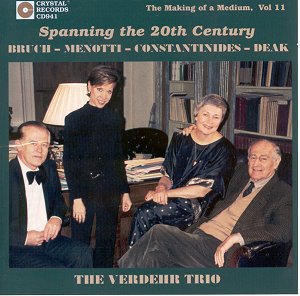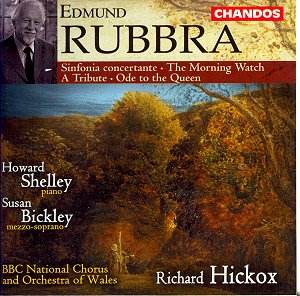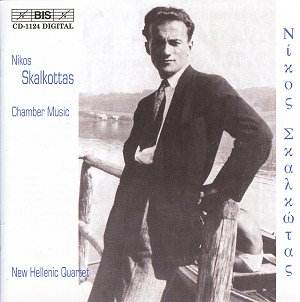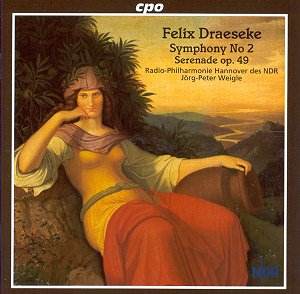 Composer: Dinos Constantinides, Gian Carlo Menotti, Max Bruch, Jon Deak
Composer: Dinos Constantinides, Gian Carlo Menotti, Max Bruch, Jon Deak
Works: The Oracle at Delphi (1994), Clarinet Trio (1996), Two Pieces Op. 83 Nos. 8 and 4 (1909), Lad, A Dog: The Trio
Performers: Walter Verdehr (violin), Elsa Ludewig-Verdehr (clarinet), Kathryn Brown (piano)
Recording: Crystal Records CD941
Label: Crystal Records
Dinos Constantinides, a composer whose work often embodies a rich tapestry of folk influences and contemporary harmonies, is prominently featured alongside giants like Gian Carlo Menotti and Max Bruch in this engaging collection by the Verhdehr Trio. Each of the works presented here reflects the diverse landscape of the twentieth century, a period marked by stylistic experimentation and a reexamination of tonal traditions. The ensemble’s commitment to exploring lesser-known pieces alongside established repertoire creates a compelling listening experience, showcasing the eclectic nature of modern chamber music.
The opening piece, Constantinides’ The Oracle at Delphi, is a notable work that illustrates the composer’s penchant for modal harmonies and folk-inspired motifs. The Verhdehr Trio performs it with a spirited vigor, capturing the work’s vibrant energy. The violinist Walter Verdehr’s intonation is particularly commendable, weaving through the melodic lines with a clarity that enhances the folk-like elements. The piano, played by Kathryn Brown, provides a robust harmonic foundation, while Elsa Ludewig-Verdehr’s clarinet weaves in and out with an expressive lyricism. This performance is both accessible and intellectually stimulating, embodying the democratic spirit of the composer’s intentions, as it invites listeners to engage with the music on multiple levels.
Menotti’s Clarinet Trio, with its lush romanticism, offers a stark contrast to the previous piece. The ensemble’s interpretation shines through in the work’s central Romanza, where the clarinet’s soaring lines are infused with an almost operatic fervor reminiscent of Bellini. The Verhdehr Trio navigates the shifting moods with deftness, allowing the playful, Eulenspiegel-like themes to emerge organically. The recording captures the nuances of the clarinet’s tonal palette beautifully, with the sound engineering ensuring that each instrument is afforded its due prominence in this rich sonorous interplay.
Max Bruch’s Two Pieces, arranged for this trio configuration, showcase the composer’s late style, suffused with introspective melancholy. The new arrangement subtly evokes the Brahmsian influence in its piano writing, and the Verhdehr Trio embraces this with an affectionate restraint that emphasizes the bittersweet nature of the music. The blend of violin and clarinet creates a lush harmonic texture, evoking an emotional depth that resonates with the listener. Here, the engineering again stands out, allowing the darker timbres to emerge without sacrificing clarity, a testament to the high-quality production values of Crystal Records.
Jon Deak’s Lad, A Dog: The Trio introduces an element of theatricality and whimsy, reflecting the narrative qualities of the stories of Albert Payson Terhune. The performers tackle the work’s unconventional elements—like the sound of panting and swanee whistles—with a sense of playful abandon, creating a vibrant tableau of sound that is both engaging and humorous. The challenges of this piece are met with a spirited enthusiasm that showcases the trio’s versatility, culminating in a performance that is as adventurous as it is entertaining.
The Verhdehr Trio’s recording presents a stimulating collection that deftly balances familiarity and innovation. Each work is meticulously crafted, with the ensemble’s interpretive choices revealing the depth of the compositions while maintaining an inviting accessibility that is often elusive in contemporary chamber music. The sound quality is exemplary, allowing for a full appreciation of the intricate dialogues between the instruments. This release not only enriches the discography of the twentieth-century chamber repertoire but also underscores the Verhdehr Trio’s importance in bringing these varied works to new audiences, affirming their role as vital interpreters of modern classical music.



